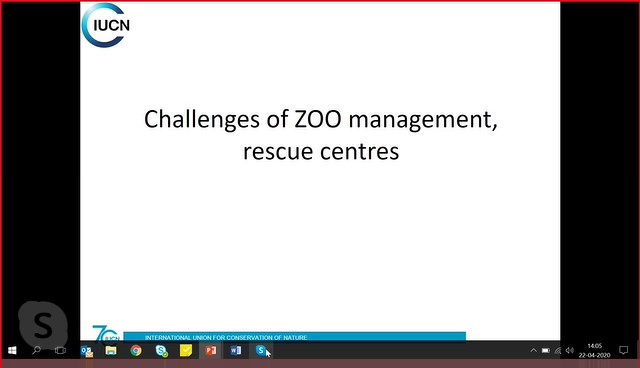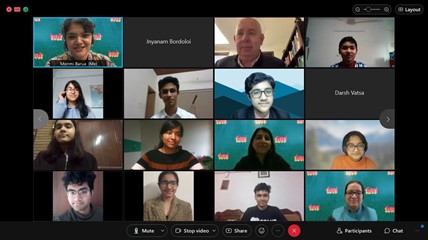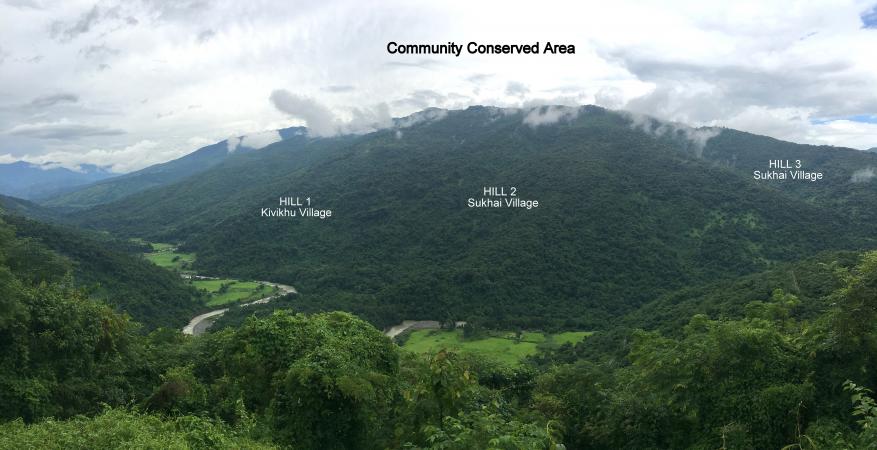NEW MEANING OF EARTH DAY IN 2020: Conservation Challenges and Opportunities in post COVID-19 world for IUCN India Members
IUCN India hosted a virtual discussion with its member organizations on “Challenges and Opportunities for Nature Conservation Post COVID-19” on 22 April 2020.

Photo: @IUCN India
In the wake of the COVID-19 pandemic capturing the world in its shackles, the IUCN India Country Office on the event of 50th Earth Day celebration on 22nd April organized an online consultation “Conservation Challenges and Opportunities in post COVID-19 world”. The consultation has been attended by IUCN India members who are also academicians, government officials, and civil society organizations. India has a strong network of 40 member organizations who are working in diverse verticals of nature conservation. IUCN India works with Members and Commissions to reduce ecosystem and species loss by providing the necessary tools and knowledge to value, conserve and use biodiversity sustainability; enhance governance and policy for better management of ecosystems and habitats, including protected areas; and address challenges related to poverty alleviation, food security and climate change.
The online consultative meeting with IUCN members in India was organised with the objective to identify key challenges and opportunities for nature conservation in a post COVID19 scenario. The session was inaugurated by Dr. Sanjay Kumar, Director General, Forest and Special Secretary, who highlighted that research is in its initial steps for control and development of antidote for Covid- 19 crisis management. However, global perspective for a healthy environment to battle such crisis is of utmost necessity. He also stressed that the post scenario impact will prepare the human race to buckle up for such future pandemic. “The necessity of organizing such a consultation forum to bring different sectors together will help channelize the ideas and perceptions from various niches of service areas to have a holistic view of the current COVID-19 situation and assess the post pandemic impacts on the conservation efforts that we will face”, emphasized by Dr Vivek Saxena, Country Representative, IUCN India. A message sent forward for the meet by Sadhguru highlighting on the need to act for ecological issues and also introduced their campaign called Planet Conscious campaign to bring this world into a conscious function. Change in climate and landscape of the world due to rapid developmental projects and exploitation of nature and its resources are very evident. Deforestation, habitat fragmentation and an expanding agricultural frontier increase the contacts between humans and other animals, potentially increasing the chances of spreading zoonotic diseases. Dr. N.M. Ishwar, Programme Coordinator provided a detailed overview of the programme and activities of IUCN India office and also informed the members on the new dates of World Conservation Congress 2021.
Dr. Soumitra Dasgupta, Inspector General of Forest, Wildlife (MoEFCC) expressed “If the spread to corona is related to the animal, such kind of zoonotic diseases should not happen in the future, we as human beings have to ensure that there is no deforestation, increase in forest cover, focus on species conservation. Third national wildlife programme in 2017 by ministry aims at proactive measures to stop spreading of the zoonotic disease, illegal wildlife struggling.” He inspired the gathering to think out of box for impactful actions.
 Photo: @IUCN India
Photo: @IUCN India
The consultation raised the issues to build local value chains to ensure optimum livelihood opportunities and subsequently reduce the demand from a global supply. Some fall offs of the consultation are the need for organized infrastructure development in sanitation, health research, nature based options, food security, and strengthened policies for ecosystem management.
The collective response on the challenges post COVID scenario includes increased pressure on land and changes in land use patterns to boost economy, funds crunch for conservation issues, project delivery at grassroots’ level impacted, rural unemployment may exacerbate human wildlife conflicts and poaching, difference of opinion in lifestyle change, management flaw of local communities during pandemic times due to limited knowledge base, gaps between public and scientific knowledge, increased bushmeat demand and the impact on renewable energy sector. However, the forum discussed the possibilities of more opportunities that can be created during the pandemic times and turning the crisis into actual benefit. Increase in holistic exposure to knowledge about the cause of pandemics, restore lost natural spaces with cooperation of multiple stakeholders including private sector, strict management initiates development to control wildlife poaching and illegal trade and opportunity to push forward green economy to achieve SDGs. The pandemic has effectively shown that nature does not need our help to restore itself but we, as a part of nature, need it more for our continued sustenance.
The closing remarks for the consultation meeting was given by Mr. Ravi Aggarwal, Additional Secretary MoEFCC stating that the pandemic helped us realise the strings that connect each one of us living on this planet together. Intervention for a sustainable future should be a more personal approach to benefit more effectively. IUCN has a consortium of experts to harness the capabilities of each other to identify various areas of work. The single-sighted developmental projects have seen the impact of such a grave magnitude that has put the world on halt. These lessons from the pandemic should be the first and the last lesson to undermine nature.
The online consultation highlighted the high spirits of the IUCN members’ and the need for concerted efforts for nature conservation.



